新外研版(2019) Unit 1 A New Start Period 1 (延伸Language pionts) 课件
文档属性
| 名称 | 新外研版(2019) Unit 1 A New Start Period 1 (延伸Language pionts) 课件 | 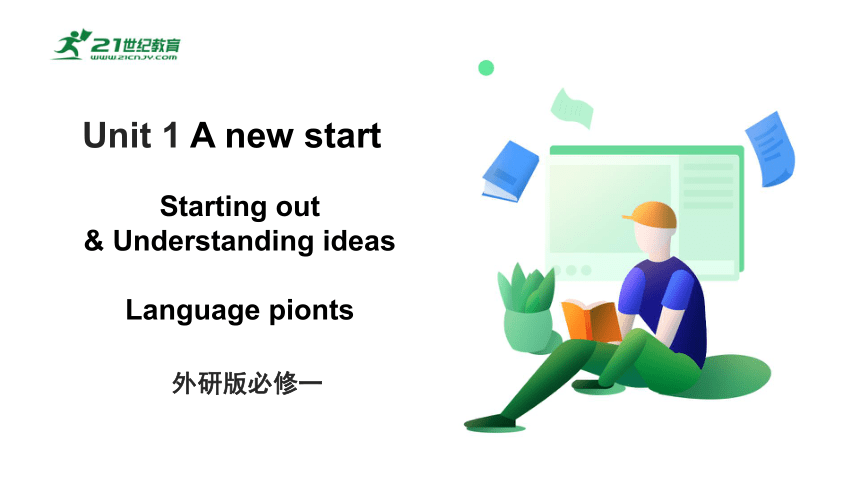 | |
| 格式 | pptx | ||
| 文件大小 | 11.5MB | ||
| 资源类型 | 试卷 | ||
| 版本资源 | 外研版(2019) | ||
| 科目 | 英语 | ||
| 更新时间 | 2022-08-26 17:47:22 | ||
图片预览

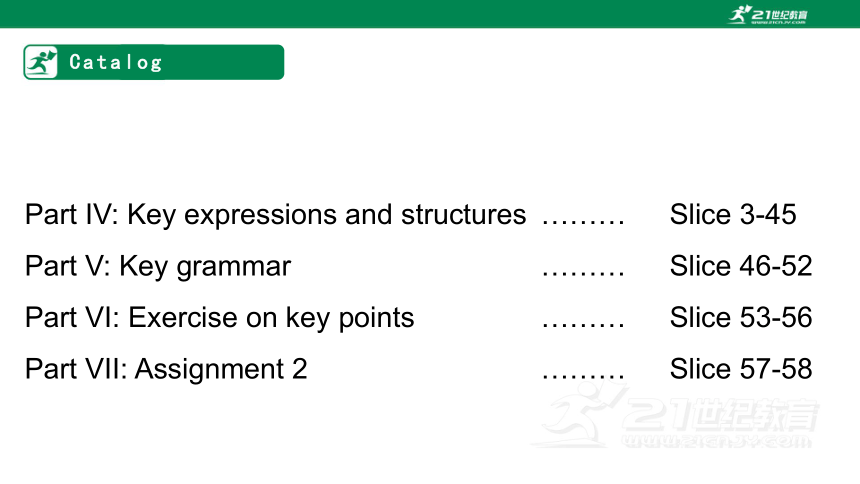
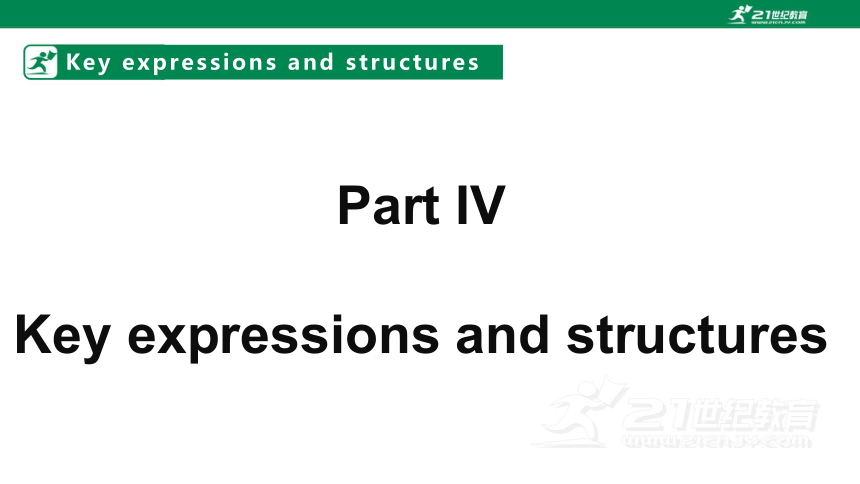
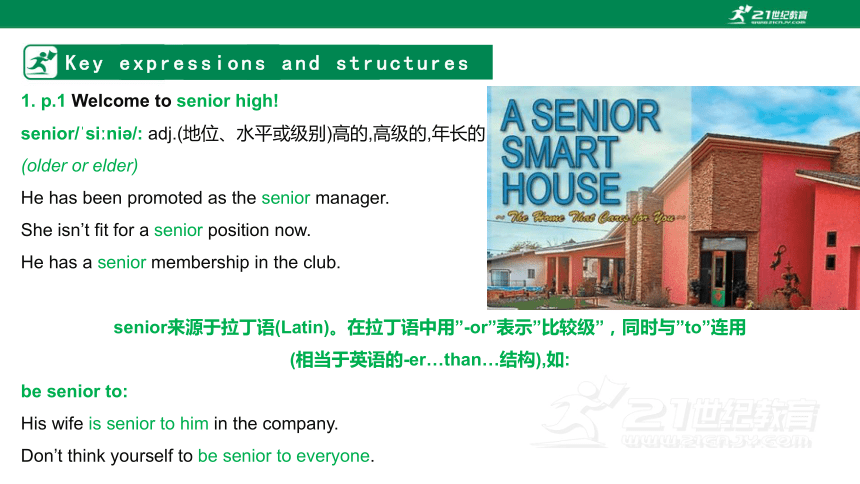
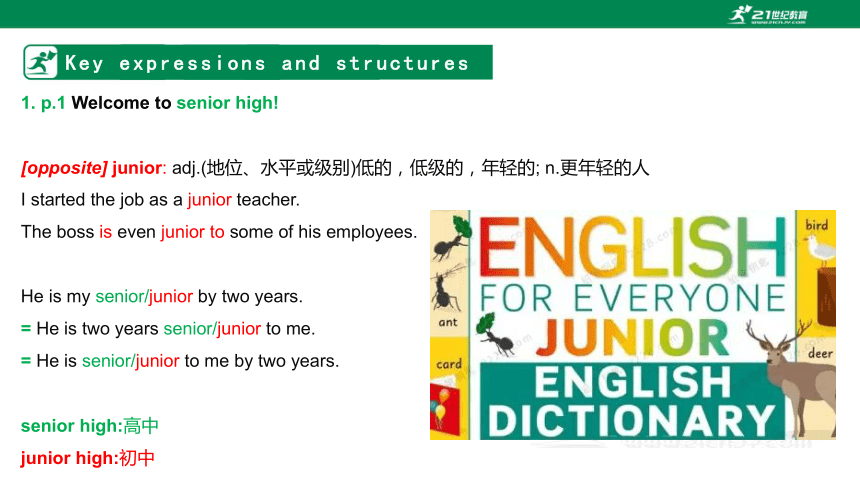
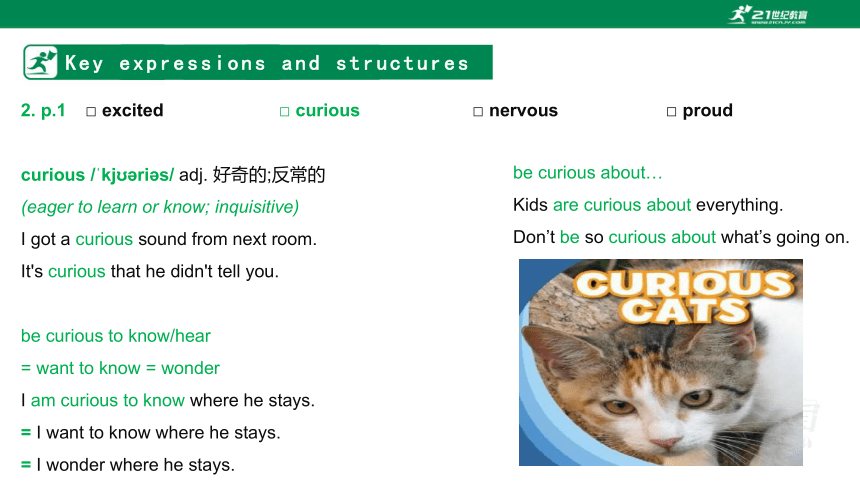
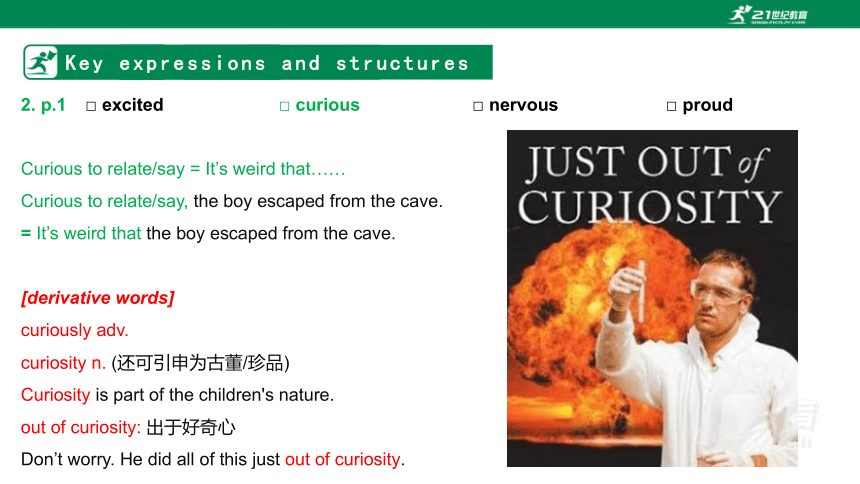
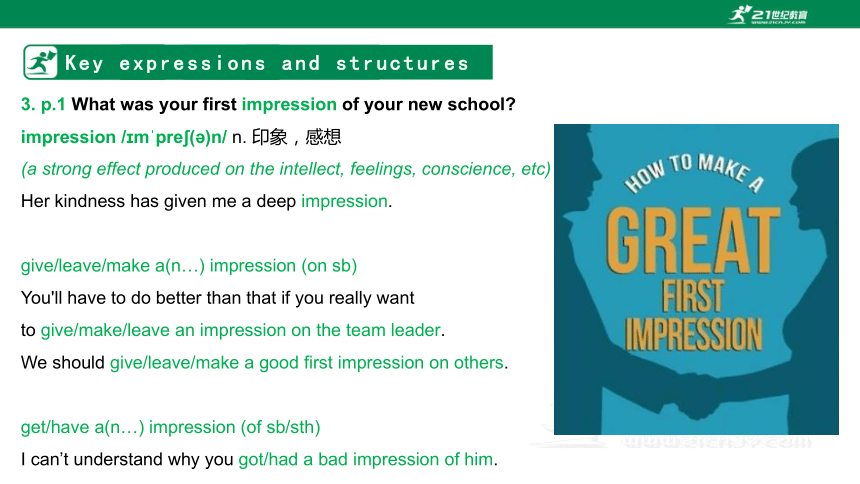
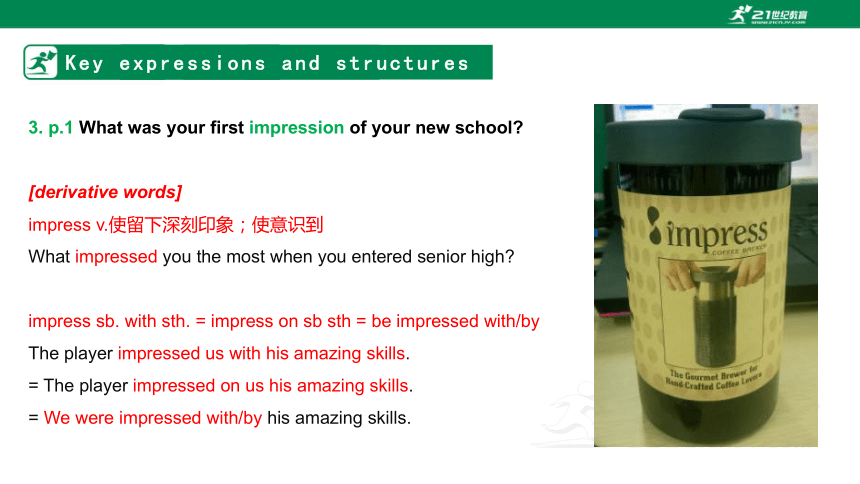
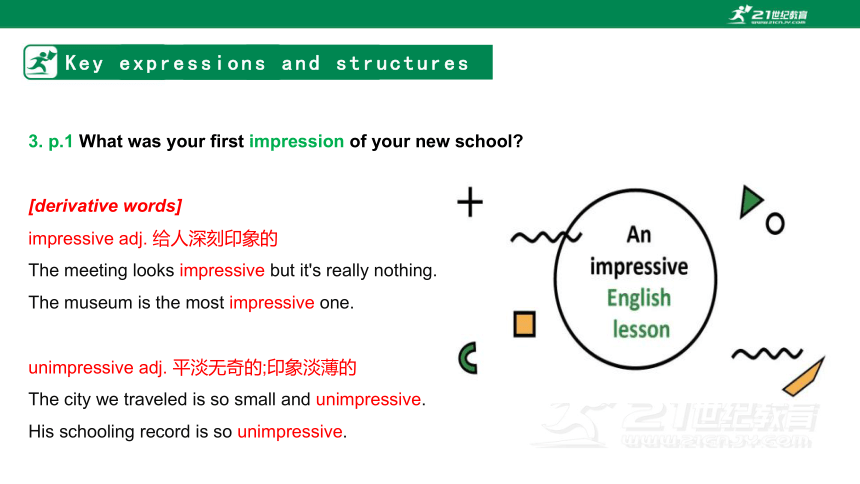
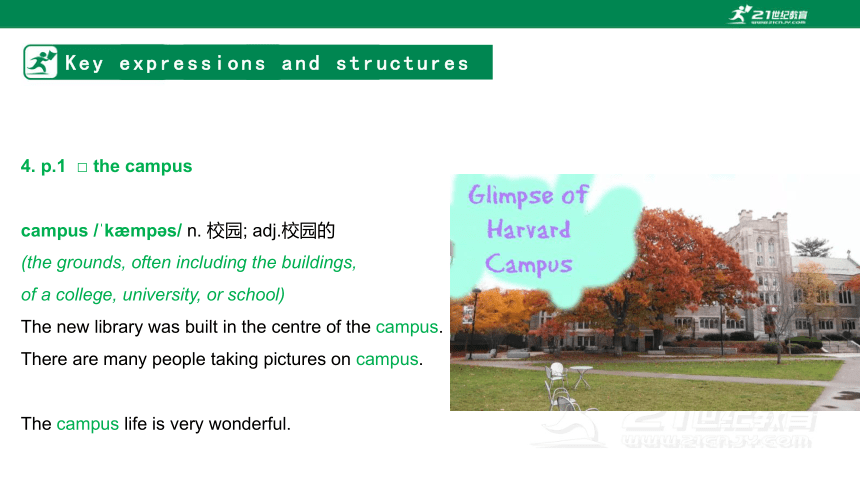
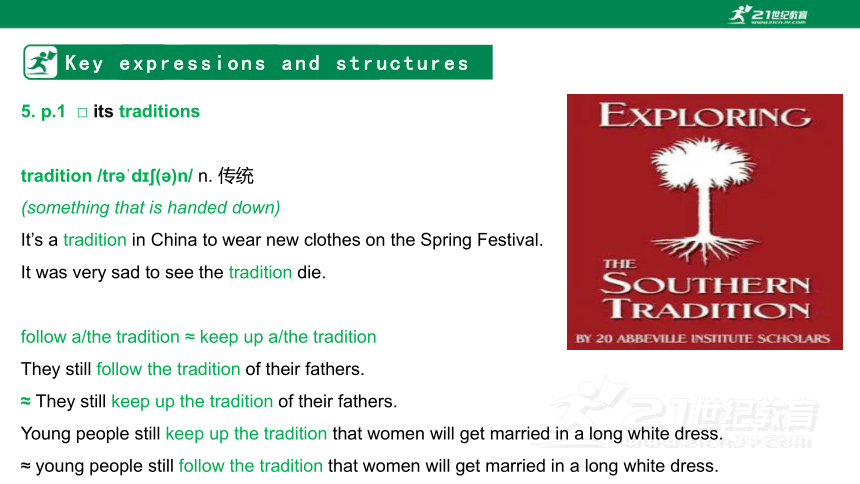
文档简介
(共60张PPT)
外研版必修一
Unit 1 A new start
Starting out
& Understanding ideas
Language pionts
Catalog
Part IV: Key expressions and structures ……… Slice 3-45
Part V: Key grammar ……… Slice 46-52
Part VI: Exercise on key points ……… Slice 53-56
Part VII: Assignment 2 ……… Slice 57-58
Key expressions and structures
Part IV
Key expressions and structures
Learning objectives
Key expressions and structures
1. p.1 Welcome to senior high!
senior/ si ni /: adj.(地位、水平或级别)高的,高级的,年长的
(older or elder)
He has been promoted as the senior manager.
She isn’t fit for a senior position now.
He has a senior membership in the club.
senior来源于拉丁语(Latin)。在拉丁语中用”-or”表示”比较级”,同时与”to”连用
(相当于英语的-er…than…结构),如:
be senior to:
His wife is senior to him in the company.
Don’t think yourself to be senior to everyone.
Learning objectives
Key expressions and structures
1. p.1 Welcome to senior high!
[opposite] junior: adj.(地位、水平或级别)低的,低级的,年轻的; n.更年轻的人
I started the job as a junior teacher.
The boss is even junior to some of his employees.
He is my senior/junior by two years.
= He is two years senior/junior to me.
= He is senior/junior to me by two years.
senior high:高中
junior high:初中
Learning objectives
Key expressions and structures
2. p.1 □ excited □ curious □ nervous □ proud
curious / kj ri s/ adj. 好奇的;反常的
(eager to learn or know; inquisitive)
I got a curious sound from next room.
It's curious that he didn't tell you.
be curious to know/hear
= want to know = wonder
I am curious to know where he stays.
= I want to know where he stays.
= I wonder where he stays.
be curious about…
Kids are curious about everything.
Don’t be so curious about what’s going on.
Learning objectives
Key expressions and structures
2. p.1 □ excited □ curious □ nervous □ proud
Curious to relate/say = It’s weird that……
Curious to relate/say, the boy escaped from the cave.
= It’s weird that the boy escaped from the cave.
[derivative words]
curiously adv.
curiosity n. (还可引申为古董/珍品)
Curiosity is part of the children's nature.
out of curiosity: 出于好奇心
Don’t worry. He did all of this just out of curiosity.
Learning objectives
Key expressions and structures
3. p.1 What was your first impression of your new school
impression / m pre ( )n/ n. 印象,感想
(a strong effect produced on the intellect, feelings, conscience, etc)
Her kindness has given me a deep impression.
give/leave/make a(n…) impression (on sb)
You'll have to do better than that if you really want
to give/make/leave an impression on the team leader.
We should give/leave/make a good first impression on others.
get/have a(n…) impression (of sb/sth)
I can’t understand why you got/had a bad impression of him.
Learning objectives
Key expressions and structures
3. p.1 What was your first impression of your new school
[derivative words]
impress v.使留下深刻印象;使意识到
What impressed you the most when you entered senior high
impress sb. with sth. = impress on sb sth = be impressed with/by
The player impressed us with his amazing skills.
= The player impressed on us his amazing skills.
= We were impressed with/by his amazing skills.
Learning objectives
Key expressions and structures
3. p.1 What was your first impression of your new school
[derivative words]
impressive adj. 给人深刻印象的
The meeting looks impressive but it's really nothing.
The museum is the most impressive one.
unimpressive adj. 平淡无奇的;印象淡薄的
The city we traveled is so small and unimpressive.
His schooling record is so unimpressive.
Learning objectives
Key expressions and structures
4. p.1 □ the campus
campus / k mp s/ n. 校园; adj.校园的
(the grounds, often including the buildings,
of a college, university, or school)
The new library was built in the centre of the campus.
There are many people taking pictures on campus.
The campus life is very wonderful.
Learning objectives
Key expressions and structures
5. p.1 □ its traditions
tradition /tr d ( )n/ n. 传统
(something that is handed down)
It’s a tradition in China to wear new clothes on the Spring Festival.
It was very sad to see the tradition die.
follow a/the tradition ≈ keep up a/the tradition
They still follow the tradition of their fathers.
≈ They still keep up the tradition of their fathers.
Young people still keep up the tradition that women will get married in a long white dress.
≈ young people still follow the tradition that women will get married in a long white dress.
Learning objectives
Key expressions and structures
5. p.1 □ its traditions
break with tradition
They decided to break with tradition so that they can live out of the town.
It’s hard to say whether breaking with old tradition is good.
[derivative words]
traditional adj.
traditionally adv.
The traditional breakfast in this area includes bacon and eggs.
It’s traditional for them to leave home at the age of 18.
Traditionally speaking, they are still regarded as children.
Learning objectives
Key expressions and structures
6. p.1 □ its facilities
facility /f s l ti/ n. 设施; 才能;熟练
(something designed, built, installed, etc., to serve
a specific function affording a convenience or service)
The college has excellent sporting facilities.
There are few recreational facilities in our school.
(readiness or ease due to skill, aptitude, or practice)
He has great facility in learning languages.
He showed great facility in speaking.
different school facilities
Learning objectives
Key expressions and structures
7. p.2 □ an embarrassing moment
moment / m m nt/ n.某一时刻
(an indefinitely short period of time; instant)
Love is a moment that lasts forever.
She answered without a moment’s thinking.
wait a moment ≈ wait a minute/while.
Please wait a moment/minute/while. I’ll be back soon.
big/great moment ≈ important moment
The big/great moment has finally come.
Learning objectives
Key expressions and structures
7. p.2 □ an embarrassing moment
in a moment/while/minute ≈ soon ≈ right away ≈ at once ≈ immediately ≈ instantly
He will be back in a moment/while/minute.
= He will be back soon/right away/at once/immediately/instantly.
at the moment ≈ now ≈ at present (≈ for the time being)
I’m learning German at the moment/at present/now.
for the moment ≈ for the time being
Let's leave the matter aside for the moment/for the time being.
For the moment/For the time being, it is too early to say anything.
Learning objectives
Key expressions and structures
7. p.2 □ an embarrassing moment
the moment (that)+ clause ≈ as soon as ≈ when + clause
I will tell her the moment (that) she arrives.
≈ I will tell her as soon as she arrives.
≈ I will tell her when she arrives.
The moment I saw her, I said "hello" to her.
You can have the magazine the moment I finish reading it.
The moment you get up on Christmas, you will have a big surprise.
Learning objectives
Key expressions and structures
8. p.2 Read the passage and find out what the author wrote in his diary about his first day at senior high.
author / θ / n. 作者,作家
(a person who writes a novel, poem, essay, etc.)
This book shows that he is a potential author.
The book was published without the permission of the author.
writer:
(a person engaged in writing books, articles, stories, etc.,
especially as an occupation or profession)
What does the writer imply in the last paragraph
A writer lives out of writing, while an author probably not.
Learning objectives
Key expressions and structures
9. p.2 I woke up early and rushed out of the door in my eagerness to get to know my new school.
eagerness / i ɡ n s/ n. 热切,渴望
(a positive feeling of wanting to push ahead with something)
She shows great eagerness for success.
Her eagerness moved all the people.
have (the) eagerness to do = in one’s eagerness to do sth
He has (the) eagerness to learn whatever taught at school.
= He is in his eagerness to learn whatever taught at school.
Learning objectives
Key expressions and structures
9. p.2 I woke up early and rushed out of the door in my eagerness to get to know my new school.
[derivative words]
① eager adj.
② eagerly adv.
be eager to do sth = be eager for/after sth
He is so eager to achievement success.
He is eager for/after success.
be eager for sb to do sth = want sb to do sth badly
He is eager for you to meet his friends. = He wants you to meet his friends badly.
Learning objectives
Key expressions and structures
9. p.2 I woke up early and rushed out of the door in my eagerness to get to know my new school.
[derivative words]
too eager to do = can’t wait to do
She was too eager to know the result of her experiment.
= She can’t wait to know the result of her experiment.
= She is so eager to know the result of her experiment.
extra:
eagerer = more eager
eagerest = most eager
Learning objectives
Key expressions and structures
10. p.2 The campus was still quiet when I arrived, so I decided to explore a bit.
explore / k spl / v. 考察,探险
(to traverse or range over for the purpose of discovery;
to look into closely.)
The experts are exploring every part of the island.
Columbus discovered America but did not explore the new continent.
[derivative words]
explorer n.
Columbus has been one of the greatest explorers.
exploration n.
This is an age of exploration and discovery.
Learning objectives
Key expressions and structures
11. p.3 Before we start, please come to the front one by one and introduce yourself to the class.
one by one 依次地,一个接一个地
(one at a time; separately, one after the other)
They entered the classroom one by one.
Let me answer your questions one by one.
one by one = one after another/the other = one at a time
Please come in one by one.
Please come in one after another.
= Please come in one after the other.
= Please come in one at a time.
Learning objectives
Key expressions and structures
12. p.3 I tried to turn on my brain but the engine just wouldn’t start.
engine / end n/ n. 发动机,引擎
(a machine for converting thermal energy into
mechanical energy or power to produce force and motion.)
There must be something wrong with the engine of my car.
Technology is the most important engine of modern society.
[derivative words]
engineer n.
His dream is to become an engineer.
Learning objectives
Key expressions and structures
13. p.3 Something about my insect collection, perhaps.
insect / nsekt/ n. 昆虫
(having the body divided into three parts, and
having three pairs of legs and
usually two pairs of wings.)
The insect bit him and drew blood from his arm.
Does a fly belong to any kind of insect
Learning objectives
Key expressions and structures
13. p.3 Something about my insect collection, perhaps.
collection /k lek ( )n/ n. ( 一批)收藏品
(the act of collecting.)
The collection of these stamps took ten years.
She selected a diamond ring from the collection.
[derivative words]
collect v.
He used to collect cards, but now he likes to collect stamps.
He's collecting money for the flood.
collector n.
He is a famous private collector.
Throw everything into the Garbage Collector.
a coin collection
Learning objectives
Key expressions and structures
14. p.3 I was organising my words in my head when the girl next to me gave me a nudge.
organise (Am.E organize) / ɡ na z/ v. 组织;安排
(to form as or into a whole consisting
of interdependent or coordinated parts,
especially for united action.)
Please organize your thoughts before speaking.
The meeting was badly organized.
[derivative words]
organized adj.
Everything is so organized.
It seems the part is well/badly/carefully organized.
disorganized adj.
The opening ceremony is a little disorganized.
The office became completely disorganized.
Learning objectives
Key expressions and structures
14. p.3 I was organising my words in my head when the girl next to me gave me a nudge.
organization n.
We can set up a student organization.
A voluntary organization will never seek to earn profit.
organizer n.
A good organizer pays attention to every detail.
The meeting ended with a speech by the organizer.
nudge /n d / n. (通常用肘)轻推
(to push slightly or gently, especially with the elbow, to get someone's attention, prod someone into action, etc)
She nudged me with her elbow and pointed at the man talking on the phone.
Learning objectives
Key expressions and structures
15. p.3 With butterflies in my stomach,I breathed deeply.
butterfly / b t fla / n. 蝴蝶
butterflies in one’s stomach:情绪紧张,心里发慌
(informal: a feeling of being very nervous before doing something)
Do you get butterflies in your stomach when you have to talk to lots of people
She had terrible butterflies (in her stomach) every time as she gave a public speaking.
breathe /bri / v. 呼吸
(to take air, oxygen, etc., into the lungs and expel it)
The policeman asks him to breathe in and (breathe) out to ease his nervousness.
He tried to breath deeply to prepare for the upcoming interview.
fly n. 苍蝇
dragonfly n. 蜻蜓
firefly n. 萤火虫
Learning objectives
Key expressions and structures
15. p.3 With butterflies in my stomach,I breathed deeply.
[derivative words]
breath /breθ/ n
He took a deep breath and began to speak out his idea.
Wow! The breath of rain is just in the air!
hold one’s breath
Everyone holds their breath while waiting for the winner to be announced.
be out/short/in shortness of breath
We are out/short/in shortness of breath after running for such a long time.
Learning objectives
Key expressions and structures
15. p.3 With butterflies in my stomach,I breathed deeply.
Save your breath. ≈ Save your energy.
Save your breath/energy, please. You can never change a person’s mind.
Save your breath/energy not to ask me of this question again.
take one’s breath away ≈ astonish/shock someone
That show just takes my breath away.
take a breath ≈ take a short break
Let’s take a breath and make the decision later on.
Learning objectives
Key expressions and structures
16. p.3 I looked at them in panic.
panic / p n k/ n. 惊恐,惊慌
(a sudden overwhelming fear, with or without cause)
There was a panic when the building caught fire.
Rumors of a heavy rain caused a big panic in the city.
We just got into a panic of failure.
[derivative words]
panic adj & v (~ sb into doing sth)
The news panics so many people into selling their own cars.
I panic at the thought of my weakness.
Don’t be panic. It was just a thunder.
Learning objectives
Key expressions and structures
16. p.3 I looked at them in panic.
in panic 惊慌地
She was in panic when the alarm rang.
I think I was in great panic while giving the self-introduction
because I can not remember anything happened at that time.
extra
panic panicked panicked panicking
picnic picnicked picnicked picnicking
traffic trafficked trafficked trafficking
in (great) panic
Learning objectives
Key expressions and structures
17. p.3 Challenges like this might sometimes put you under pressure.
challenge / t l nd / n & v. 挑战
(a call or summons to engage in any contest, as of skill, strength, etc)
It’s a big challenge for us to live in an English-speaking country.
We should face the challenges in life instead of escaping.
Never try to challenge any rule that exists for a long time.
Are you ready to challenge yourself to start a new lifestyle
take up a/the challenge = accept a challenge
He did not take up/accept the challenge to swim across the river.
Do you want to take up/accept a challenge to win the grand prize
Learning objectives
Key expressions and structures
17. p.3 Challenges like this might sometimes put you under pressure.
[derivative words]
challenging adj.
She finds her new life in senior high very challenging.
The boy came with up some challenging questions at the meeting.
pressure / pre / n. 压力
(the exertion of force upon a surface by an object, fluid, etc., in contact with it)
We must get used to the life, which is full of pressure, in senior high.
His father suffers from high blood pressure..
a digital blood pressure meter/monitor
Learning objectives
Key expressions and structures
17. p.3 Challenges like this might sometimes put you under pressure.
put sb/sth under pressure = put pressure on sb/sth
Take a deep breath and don’t put yourself under such a big pressure.
= Take a deep breath and don’t put such a big pressure on yourself.
[derivative words]
press v.
press sb to do sth ≈ force sb to do sth
Don't press/force me to do my homework all the time!
The manager presses/forces his staff to work
at least 14 hours a day.
I can’t stand it anymore!
Don’t press/force me.
Learning objectives
Key expressions and structures
17. p.3 Challenges like this might sometimes put you under pressure.
press on ≈ push on
(continue moving forward; to resume one's course;
carry on one's way steadily;)
They still want to press/push on with the project
even though it seems impossible.
We have to press/push on with the work
whatever the difficulties may be.
Learning objectives
Key expressions and structures
18. p.3 But it all depends on what you do. Keep calm and be prepared.
depend /d 'pend/ v.依赖;依靠;取决于
(to rely; place trust)
It/That (all) depends. = It’s/That’s decided by the situation.
depend on/upon = rely on/upon
(if one thing depends on another, it is changed or affected by the other thing)
Children depend/rely on/upon their parents for food and clothing.
He is a man whom/who you can depend/rely on/upon to help you whenever you are in trouble.
The country depends/relies heavily on/upon its tourist trade.
Their future depends/relies on/upon how hard they work in their study.
Learning objectives
Key expressions and structures
18. p.3 But it all depends on what you do. Keep calm and be prepared.
In oral English, s “You may/can depend on/upon it (that…)” means “You can be 100% sure (that…)”.
You may/can depend on/upon it that English is of great importance.
[derivative words]
independent adj (in- + depend + -ent)
(not influenced or controlled by others in matters of
opinion, conduct, etc.; thinking or acting for oneself)
independence n
You should learn to be independent of your parents.
How to be independent is still a question for senior high students.
The country gained independence in the 1880s.
Learning objectives
Key expressions and structures
18. p.3 But it all depends on what you do. Keep calm and be prepared.
calm /kɑ m/ adj. 镇静的,沉着的,平静的
(without rough motion; still or nearly still)
The calm weather gave no hint of the storm that was coming.
keep/stay/remain calm (keep, stay, and remain are all linking verbs here)
She always remains cool, calm and collected in a crisis.
You should keep calm even in face of danger.
calm n & v
You never know what is going through his mind under his calm.
calm down (oneself)
He can hardly calm down (himself) before exams.
Learning objectives
Key expressions and structures
19. p.3 That way, you’ll make the most of your time at senior high.
make the most of = make full/good use of
(to gain the greatest possible advantage from something)
It’s a beautiful day. We should make the most/make full/good use of it.
I always get up early even when I'm on holiday
to make the most of every single day to learn and experience.
make use of ≈ take advantage of
Let’s make use of the class to learn as much as possible.
= Let’s take advantage of the class to learn as much as possible.
Learning objectives
Key expressions and structures
20. p.4 Choose the best description of Meng Hao’s first day at senior high.
description /d skr p ( )n/ n. 描述,描写,叙述,形容
(a statement, picture in words, or account that describes;
descriptive representation)
He gave a long/short/detailed description of what he had seen.
He is very good at descriptions about differences among people.
beyond description(s)
The city is beautiful beyond descriptions.
You have to experience everything yourself
because sometimes things are beyond description.
Learning objectives
Key expressions and structures
20. p.4 Choose the best description of Meng Hao’s first day at senior high.
[derivative words]
describe v.
Words can’t describe her beauty.
It’s difficult to describe how I feel.
describe sth to/for sb
Can you describe your son to/for me
describe A as B
She described him as shy.
He describes himself as an artist.
English is described as an easy language.
describe doing sth
He describes finding the old man dead in a dark room.
These words describe holding your arms tightly.
Learning objectives
Key expressions and structures
21. p.4 With the English teacher’s support, he thought senior high was easy and felt confident about his future.
confident / k nf d( )nt/ adj. 有信心的,自信的
(having strong belief or full assurance; sure)
Being confident is really important for a person,
but never be overconfident.
She looks confident about the exams that we are going to take.
be confident in/about/of/that
I'm confident in/about/of the path I have chosen.
We are confident that we will win.
Learning objectives
Key expressions and structures
20. p.4 With the English teacher’s support, he thought senior high was easy and felt confident about his future.
[derivative words]
overconfident (too confident)
A confident man looks wise, while an overconfident man may appear stupid.
confidence n.
We have full confidence that we shall succeed.
Don’t lose your confidence just because failing once.
confidently adv.
He stepped confidently into the room and began to speak.
Key grammar
Part V
Key grammar
Learning objectives
Key grammar
1. p.2 After I had pictured it over and over again in my mind, the big day finally arrived: my first day at senior high!
p.3 I had been too nervous to pay attention when he introduced himself!
Past perfect simple: the tense is used to go further back in time when we are already talking about the past. It can make it clear that something had already happened at the time we are talking about.
过去完成时: 即”过去的过去”,结构为had done
Learning objectives
Key grammar
Try to compare the following sentences.
I had already done the shopping by the time she came home.
I was late for work, by the time I arrived the client had already left.
By the end of last year, we had already finished learning the course.
I had been at the bus stop for 20 minutes when a bus finally came.
He said he had worked in that factory since 1949.
I returned the book that I had borrowed.
Until then he had known nothing about it.
The boy told his mother that he had been ill since he came back from school.
She had only been here for then minutes when Jim came in.
When they got to the field, the match had already started.
Learning objectives
Key grammar
2. p.2 I was looking at the photos on the noticeboard when I heard a voice behind me.
p.3 I was organising my words in my head when the girl next to me gave me a nudge.
Past Continuous: the tense is often used in the “sb/sth was/were doing when sb/sth did (when sb/sth did, sb/sth was/were doing)” structure.
I was watching TV when the telephone rang.
They were walking in the street when the accident happened.
Learning objectives
Key grammar
The past continuous tense is also used in the “As sb/sth was/were doing, sb/sth did/was/were doing” or “While sb/sth was/were doing, sb/sth did/was/were doing” structure.
Try to compare the following sentences.
We were dancing while the band was playing.
He cut himself while (he was) shaving.
As she was driving to work, it started to rain heavily.
Why weren't you listening carefully when I explained before
What was Linda doing when he ran away
She gave us a smile while we were discussing the question.
Learning objectives
Key grammar
3. p.2 Turning around, I saw a white-haired man.
We could also say: I turned around and saw a man with white hair.
The present participle (V-ing) can be used as different kinds of adverbials. It can be seen as a shortened adverbial clause while the subjects should be the same.
Finishing his homework, he went out for a walk.
= After he (had) finished his homework, he went out for a walk.
Seeing them leave, she starts to cry.
= Because she sees them leave, she starts to cry.
Learning objectives
Key grammar
Try to compare the following sentences.
Winning the game, everyone jumped and cheered.
Living and experiencing senior high, you will be more in dependent.
He immediately ran away, seeing what happened.
Being shocked by what was happening, we can not say a single word.
It has rained for a couple of hours, leading to the traffic jam in rush hours.
Talking on the phone loudly, she came in without realizing what had gone wrong.
Not taking enough exercise, she failed in the exam again.
Looking back on the things I’ve done, I’m pretty proud of myself.
Exercise on key points
Part VI
Exercise on key points
Learning objectives
Exercise on key points
Fill in the blanks with the correct form.
1. Jack stood by the lake _________ (breathe) deeply and evenly.
2. The government has built more and more fitness _________ (facility) in these neighbourhood.
3. Serena Williams shows great _________ (eager) for success.
4. This young man has left a good _________ (impress) on the boss.
5. I really enjoy the vivid _________ (describe) of country life in this novel!
6. This is a _________ (traditional) of our family to give gifts to each other at Christmas.
7. Thanks to the knowledgeable guide,our tour was really _________ (impress).
8. _____________________ (traditional speak), college students will have more free time.
9. Group activities will ______________ (organize) after class to help children develop team spirit.
10. A good teacher inspires ____________ (confident) in students who wish to seek their own answers.
breathing
facilities
eagerness
impression
description
tradition
impressive
be organized
Traditionally speaking
confidence
Learning objectives
Exercise on key points
Fill in the blanks with the correct form.
11. It _________ (start) to rain when I _________ (do) my homework.
12. Amy _________ (talk) on the phone while her father _________ (drive) her to school.
13. _________ (Turn) left and _________ (walk) for 3 minutes, you will find the bookstore to your left.
14. We _________ (leave) the room before the rain yesterday evening.
15. The book ____________ (not come) out by the time the writer _________ (pass) away.
16. She started to talk in a low voice, tears _________ (come) down.
17. He ____________ (realize) the importance of education before he went to primary school.
18. The hospital has got new medical equipment, ____________ (allow) more patients to be treated.
19. The city has a long history, ____________ (show) that it has so many traditions.
20. ____________ (Enlarge), the park is now big enough to hold all the visitors.
started
was doing
was talking
was driving
Turning
walking
had left
hadn’t come
passed
coming
had realized
allowing
showing
Being enlarged
Have been enlarged
Exercise on key points
Complete the passage with the correct form.
Our school is quite famous for _________ (it) long history. It _________ (begin) in the early 1920s. It is a good place for us _________ (prepare) ourselves for the future. We have many _________ (wonder) teachers who are always ready to offer help. They encourage us to try out new ideas and ask questions. _________ their help, we have developed all kinds of interests in both arts and science. Students can choose to join any school clubs they are _________ (interest) in. We can also choose the subjects _________ we want to study. Last term I selected American Literature _________ I wanted to learn about famous American writers. This term I _________ (choose) to attend music classes because my father bought me a piano as a birthday present. I am looking forward to _________ (meet) everyone in my school!
its
began
to prepare
wonderful
With
interested
that/which
because
chose
had chosen
meeting
Assignment
Part VII
Assignment 2
Assignment
1. Review what we learned, especially the key parts;
2. Recite all the key words and expressions, paraphrases and derivative words included;
3. Preview “the Grammar part of using language”
Thank You
21世纪教育网(www.21cnjy.com)
中小学教育资源网站
兼职招聘:
https://www.21cnjy.com/recruitment/home/admin
外研版必修一
Unit 1 A new start
Starting out
& Understanding ideas
Language pionts
Catalog
Part IV: Key expressions and structures ……… Slice 3-45
Part V: Key grammar ……… Slice 46-52
Part VI: Exercise on key points ……… Slice 53-56
Part VII: Assignment 2 ……… Slice 57-58
Key expressions and structures
Part IV
Key expressions and structures
Learning objectives
Key expressions and structures
1. p.1 Welcome to senior high!
senior/ si ni /: adj.(地位、水平或级别)高的,高级的,年长的
(older or elder)
He has been promoted as the senior manager.
She isn’t fit for a senior position now.
He has a senior membership in the club.
senior来源于拉丁语(Latin)。在拉丁语中用”-or”表示”比较级”,同时与”to”连用
(相当于英语的-er…than…结构),如:
be senior to:
His wife is senior to him in the company.
Don’t think yourself to be senior to everyone.
Learning objectives
Key expressions and structures
1. p.1 Welcome to senior high!
[opposite] junior: adj.(地位、水平或级别)低的,低级的,年轻的; n.更年轻的人
I started the job as a junior teacher.
The boss is even junior to some of his employees.
He is my senior/junior by two years.
= He is two years senior/junior to me.
= He is senior/junior to me by two years.
senior high:高中
junior high:初中
Learning objectives
Key expressions and structures
2. p.1 □ excited □ curious □ nervous □ proud
curious / kj ri s/ adj. 好奇的;反常的
(eager to learn or know; inquisitive)
I got a curious sound from next room.
It's curious that he didn't tell you.
be curious to know/hear
= want to know = wonder
I am curious to know where he stays.
= I want to know where he stays.
= I wonder where he stays.
be curious about…
Kids are curious about everything.
Don’t be so curious about what’s going on.
Learning objectives
Key expressions and structures
2. p.1 □ excited □ curious □ nervous □ proud
Curious to relate/say = It’s weird that……
Curious to relate/say, the boy escaped from the cave.
= It’s weird that the boy escaped from the cave.
[derivative words]
curiously adv.
curiosity n. (还可引申为古董/珍品)
Curiosity is part of the children's nature.
out of curiosity: 出于好奇心
Don’t worry. He did all of this just out of curiosity.
Learning objectives
Key expressions and structures
3. p.1 What was your first impression of your new school
impression / m pre ( )n/ n. 印象,感想
(a strong effect produced on the intellect, feelings, conscience, etc)
Her kindness has given me a deep impression.
give/leave/make a(n…) impression (on sb)
You'll have to do better than that if you really want
to give/make/leave an impression on the team leader.
We should give/leave/make a good first impression on others.
get/have a(n…) impression (of sb/sth)
I can’t understand why you got/had a bad impression of him.
Learning objectives
Key expressions and structures
3. p.1 What was your first impression of your new school
[derivative words]
impress v.使留下深刻印象;使意识到
What impressed you the most when you entered senior high
impress sb. with sth. = impress on sb sth = be impressed with/by
The player impressed us with his amazing skills.
= The player impressed on us his amazing skills.
= We were impressed with/by his amazing skills.
Learning objectives
Key expressions and structures
3. p.1 What was your first impression of your new school
[derivative words]
impressive adj. 给人深刻印象的
The meeting looks impressive but it's really nothing.
The museum is the most impressive one.
unimpressive adj. 平淡无奇的;印象淡薄的
The city we traveled is so small and unimpressive.
His schooling record is so unimpressive.
Learning objectives
Key expressions and structures
4. p.1 □ the campus
campus / k mp s/ n. 校园; adj.校园的
(the grounds, often including the buildings,
of a college, university, or school)
The new library was built in the centre of the campus.
There are many people taking pictures on campus.
The campus life is very wonderful.
Learning objectives
Key expressions and structures
5. p.1 □ its traditions
tradition /tr d ( )n/ n. 传统
(something that is handed down)
It’s a tradition in China to wear new clothes on the Spring Festival.
It was very sad to see the tradition die.
follow a/the tradition ≈ keep up a/the tradition
They still follow the tradition of their fathers.
≈ They still keep up the tradition of their fathers.
Young people still keep up the tradition that women will get married in a long white dress.
≈ young people still follow the tradition that women will get married in a long white dress.
Learning objectives
Key expressions and structures
5. p.1 □ its traditions
break with tradition
They decided to break with tradition so that they can live out of the town.
It’s hard to say whether breaking with old tradition is good.
[derivative words]
traditional adj.
traditionally adv.
The traditional breakfast in this area includes bacon and eggs.
It’s traditional for them to leave home at the age of 18.
Traditionally speaking, they are still regarded as children.
Learning objectives
Key expressions and structures
6. p.1 □ its facilities
facility /f s l ti/ n. 设施; 才能;熟练
(something designed, built, installed, etc., to serve
a specific function affording a convenience or service)
The college has excellent sporting facilities.
There are few recreational facilities in our school.
(readiness or ease due to skill, aptitude, or practice)
He has great facility in learning languages.
He showed great facility in speaking.
different school facilities
Learning objectives
Key expressions and structures
7. p.2 □ an embarrassing moment
moment / m m nt/ n.某一时刻
(an indefinitely short period of time; instant)
Love is a moment that lasts forever.
She answered without a moment’s thinking.
wait a moment ≈ wait a minute/while.
Please wait a moment/minute/while. I’ll be back soon.
big/great moment ≈ important moment
The big/great moment has finally come.
Learning objectives
Key expressions and structures
7. p.2 □ an embarrassing moment
in a moment/while/minute ≈ soon ≈ right away ≈ at once ≈ immediately ≈ instantly
He will be back in a moment/while/minute.
= He will be back soon/right away/at once/immediately/instantly.
at the moment ≈ now ≈ at present (≈ for the time being)
I’m learning German at the moment/at present/now.
for the moment ≈ for the time being
Let's leave the matter aside for the moment/for the time being.
For the moment/For the time being, it is too early to say anything.
Learning objectives
Key expressions and structures
7. p.2 □ an embarrassing moment
the moment (that)+ clause ≈ as soon as ≈ when + clause
I will tell her the moment (that) she arrives.
≈ I will tell her as soon as she arrives.
≈ I will tell her when she arrives.
The moment I saw her, I said "hello" to her.
You can have the magazine the moment I finish reading it.
The moment you get up on Christmas, you will have a big surprise.
Learning objectives
Key expressions and structures
8. p.2 Read the passage and find out what the author wrote in his diary about his first day at senior high.
author / θ / n. 作者,作家
(a person who writes a novel, poem, essay, etc.)
This book shows that he is a potential author.
The book was published without the permission of the author.
writer:
(a person engaged in writing books, articles, stories, etc.,
especially as an occupation or profession)
What does the writer imply in the last paragraph
A writer lives out of writing, while an author probably not.
Learning objectives
Key expressions and structures
9. p.2 I woke up early and rushed out of the door in my eagerness to get to know my new school.
eagerness / i ɡ n s/ n. 热切,渴望
(a positive feeling of wanting to push ahead with something)
She shows great eagerness for success.
Her eagerness moved all the people.
have (the) eagerness to do = in one’s eagerness to do sth
He has (the) eagerness to learn whatever taught at school.
= He is in his eagerness to learn whatever taught at school.
Learning objectives
Key expressions and structures
9. p.2 I woke up early and rushed out of the door in my eagerness to get to know my new school.
[derivative words]
① eager adj.
② eagerly adv.
be eager to do sth = be eager for/after sth
He is so eager to achievement success.
He is eager for/after success.
be eager for sb to do sth = want sb to do sth badly
He is eager for you to meet his friends. = He wants you to meet his friends badly.
Learning objectives
Key expressions and structures
9. p.2 I woke up early and rushed out of the door in my eagerness to get to know my new school.
[derivative words]
too eager to do = can’t wait to do
She was too eager to know the result of her experiment.
= She can’t wait to know the result of her experiment.
= She is so eager to know the result of her experiment.
extra:
eagerer = more eager
eagerest = most eager
Learning objectives
Key expressions and structures
10. p.2 The campus was still quiet when I arrived, so I decided to explore a bit.
explore / k spl / v. 考察,探险
(to traverse or range over for the purpose of discovery;
to look into closely.)
The experts are exploring every part of the island.
Columbus discovered America but did not explore the new continent.
[derivative words]
explorer n.
Columbus has been one of the greatest explorers.
exploration n.
This is an age of exploration and discovery.
Learning objectives
Key expressions and structures
11. p.3 Before we start, please come to the front one by one and introduce yourself to the class.
one by one 依次地,一个接一个地
(one at a time; separately, one after the other)
They entered the classroom one by one.
Let me answer your questions one by one.
one by one = one after another/the other = one at a time
Please come in one by one.
Please come in one after another.
= Please come in one after the other.
= Please come in one at a time.
Learning objectives
Key expressions and structures
12. p.3 I tried to turn on my brain but the engine just wouldn’t start.
engine / end n/ n. 发动机,引擎
(a machine for converting thermal energy into
mechanical energy or power to produce force and motion.)
There must be something wrong with the engine of my car.
Technology is the most important engine of modern society.
[derivative words]
engineer n.
His dream is to become an engineer.
Learning objectives
Key expressions and structures
13. p.3 Something about my insect collection, perhaps.
insect / nsekt/ n. 昆虫
(having the body divided into three parts, and
having three pairs of legs and
usually two pairs of wings.)
The insect bit him and drew blood from his arm.
Does a fly belong to any kind of insect
Learning objectives
Key expressions and structures
13. p.3 Something about my insect collection, perhaps.
collection /k lek ( )n/ n. ( 一批)收藏品
(the act of collecting.)
The collection of these stamps took ten years.
She selected a diamond ring from the collection.
[derivative words]
collect v.
He used to collect cards, but now he likes to collect stamps.
He's collecting money for the flood.
collector n.
He is a famous private collector.
Throw everything into the Garbage Collector.
a coin collection
Learning objectives
Key expressions and structures
14. p.3 I was organising my words in my head when the girl next to me gave me a nudge.
organise (Am.E organize) / ɡ na z/ v. 组织;安排
(to form as or into a whole consisting
of interdependent or coordinated parts,
especially for united action.)
Please organize your thoughts before speaking.
The meeting was badly organized.
[derivative words]
organized adj.
Everything is so organized.
It seems the part is well/badly/carefully organized.
disorganized adj.
The opening ceremony is a little disorganized.
The office became completely disorganized.
Learning objectives
Key expressions and structures
14. p.3 I was organising my words in my head when the girl next to me gave me a nudge.
organization n.
We can set up a student organization.
A voluntary organization will never seek to earn profit.
organizer n.
A good organizer pays attention to every detail.
The meeting ended with a speech by the organizer.
nudge /n d / n. (通常用肘)轻推
(to push slightly or gently, especially with the elbow, to get someone's attention, prod someone into action, etc)
She nudged me with her elbow and pointed at the man talking on the phone.
Learning objectives
Key expressions and structures
15. p.3 With butterflies in my stomach,I breathed deeply.
butterfly / b t fla / n. 蝴蝶
butterflies in one’s stomach:情绪紧张,心里发慌
(informal: a feeling of being very nervous before doing something)
Do you get butterflies in your stomach when you have to talk to lots of people
She had terrible butterflies (in her stomach) every time as she gave a public speaking.
breathe /bri / v. 呼吸
(to take air, oxygen, etc., into the lungs and expel it)
The policeman asks him to breathe in and (breathe) out to ease his nervousness.
He tried to breath deeply to prepare for the upcoming interview.
fly n. 苍蝇
dragonfly n. 蜻蜓
firefly n. 萤火虫
Learning objectives
Key expressions and structures
15. p.3 With butterflies in my stomach,I breathed deeply.
[derivative words]
breath /breθ/ n
He took a deep breath and began to speak out his idea.
Wow! The breath of rain is just in the air!
hold one’s breath
Everyone holds their breath while waiting for the winner to be announced.
be out/short/in shortness of breath
We are out/short/in shortness of breath after running for such a long time.
Learning objectives
Key expressions and structures
15. p.3 With butterflies in my stomach,I breathed deeply.
Save your breath. ≈ Save your energy.
Save your breath/energy, please. You can never change a person’s mind.
Save your breath/energy not to ask me of this question again.
take one’s breath away ≈ astonish/shock someone
That show just takes my breath away.
take a breath ≈ take a short break
Let’s take a breath and make the decision later on.
Learning objectives
Key expressions and structures
16. p.3 I looked at them in panic.
panic / p n k/ n. 惊恐,惊慌
(a sudden overwhelming fear, with or without cause)
There was a panic when the building caught fire.
Rumors of a heavy rain caused a big panic in the city.
We just got into a panic of failure.
[derivative words]
panic adj & v (~ sb into doing sth)
The news panics so many people into selling their own cars.
I panic at the thought of my weakness.
Don’t be panic. It was just a thunder.
Learning objectives
Key expressions and structures
16. p.3 I looked at them in panic.
in panic 惊慌地
She was in panic when the alarm rang.
I think I was in great panic while giving the self-introduction
because I can not remember anything happened at that time.
extra
panic panicked panicked panicking
picnic picnicked picnicked picnicking
traffic trafficked trafficked trafficking
in (great) panic
Learning objectives
Key expressions and structures
17. p.3 Challenges like this might sometimes put you under pressure.
challenge / t l nd / n & v. 挑战
(a call or summons to engage in any contest, as of skill, strength, etc)
It’s a big challenge for us to live in an English-speaking country.
We should face the challenges in life instead of escaping.
Never try to challenge any rule that exists for a long time.
Are you ready to challenge yourself to start a new lifestyle
take up a/the challenge = accept a challenge
He did not take up/accept the challenge to swim across the river.
Do you want to take up/accept a challenge to win the grand prize
Learning objectives
Key expressions and structures
17. p.3 Challenges like this might sometimes put you under pressure.
[derivative words]
challenging adj.
She finds her new life in senior high very challenging.
The boy came with up some challenging questions at the meeting.
pressure / pre / n. 压力
(the exertion of force upon a surface by an object, fluid, etc., in contact with it)
We must get used to the life, which is full of pressure, in senior high.
His father suffers from high blood pressure..
a digital blood pressure meter/monitor
Learning objectives
Key expressions and structures
17. p.3 Challenges like this might sometimes put you under pressure.
put sb/sth under pressure = put pressure on sb/sth
Take a deep breath and don’t put yourself under such a big pressure.
= Take a deep breath and don’t put such a big pressure on yourself.
[derivative words]
press v.
press sb to do sth ≈ force sb to do sth
Don't press/force me to do my homework all the time!
The manager presses/forces his staff to work
at least 14 hours a day.
I can’t stand it anymore!
Don’t press/force me.
Learning objectives
Key expressions and structures
17. p.3 Challenges like this might sometimes put you under pressure.
press on ≈ push on
(continue moving forward; to resume one's course;
carry on one's way steadily;)
They still want to press/push on with the project
even though it seems impossible.
We have to press/push on with the work
whatever the difficulties may be.
Learning objectives
Key expressions and structures
18. p.3 But it all depends on what you do. Keep calm and be prepared.
depend /d 'pend/ v.依赖;依靠;取决于
(to rely; place trust)
It/That (all) depends. = It’s/That’s decided by the situation.
depend on/upon = rely on/upon
(if one thing depends on another, it is changed or affected by the other thing)
Children depend/rely on/upon their parents for food and clothing.
He is a man whom/who you can depend/rely on/upon to help you whenever you are in trouble.
The country depends/relies heavily on/upon its tourist trade.
Their future depends/relies on/upon how hard they work in their study.
Learning objectives
Key expressions and structures
18. p.3 But it all depends on what you do. Keep calm and be prepared.
In oral English, s “You may/can depend on/upon it (that…)” means “You can be 100% sure (that…)”.
You may/can depend on/upon it that English is of great importance.
[derivative words]
independent adj (in- + depend + -ent)
(not influenced or controlled by others in matters of
opinion, conduct, etc.; thinking or acting for oneself)
independence n
You should learn to be independent of your parents.
How to be independent is still a question for senior high students.
The country gained independence in the 1880s.
Learning objectives
Key expressions and structures
18. p.3 But it all depends on what you do. Keep calm and be prepared.
calm /kɑ m/ adj. 镇静的,沉着的,平静的
(without rough motion; still or nearly still)
The calm weather gave no hint of the storm that was coming.
keep/stay/remain calm (keep, stay, and remain are all linking verbs here)
She always remains cool, calm and collected in a crisis.
You should keep calm even in face of danger.
calm n & v
You never know what is going through his mind under his calm.
calm down (oneself)
He can hardly calm down (himself) before exams.
Learning objectives
Key expressions and structures
19. p.3 That way, you’ll make the most of your time at senior high.
make the most of = make full/good use of
(to gain the greatest possible advantage from something)
It’s a beautiful day. We should make the most/make full/good use of it.
I always get up early even when I'm on holiday
to make the most of every single day to learn and experience.
make use of ≈ take advantage of
Let’s make use of the class to learn as much as possible.
= Let’s take advantage of the class to learn as much as possible.
Learning objectives
Key expressions and structures
20. p.4 Choose the best description of Meng Hao’s first day at senior high.
description /d skr p ( )n/ n. 描述,描写,叙述,形容
(a statement, picture in words, or account that describes;
descriptive representation)
He gave a long/short/detailed description of what he had seen.
He is very good at descriptions about differences among people.
beyond description(s)
The city is beautiful beyond descriptions.
You have to experience everything yourself
because sometimes things are beyond description.
Learning objectives
Key expressions and structures
20. p.4 Choose the best description of Meng Hao’s first day at senior high.
[derivative words]
describe v.
Words can’t describe her beauty.
It’s difficult to describe how I feel.
describe sth to/for sb
Can you describe your son to/for me
describe A as B
She described him as shy.
He describes himself as an artist.
English is described as an easy language.
describe doing sth
He describes finding the old man dead in a dark room.
These words describe holding your arms tightly.
Learning objectives
Key expressions and structures
21. p.4 With the English teacher’s support, he thought senior high was easy and felt confident about his future.
confident / k nf d( )nt/ adj. 有信心的,自信的
(having strong belief or full assurance; sure)
Being confident is really important for a person,
but never be overconfident.
She looks confident about the exams that we are going to take.
be confident in/about/of/that
I'm confident in/about/of the path I have chosen.
We are confident that we will win.
Learning objectives
Key expressions and structures
20. p.4 With the English teacher’s support, he thought senior high was easy and felt confident about his future.
[derivative words]
overconfident (too confident)
A confident man looks wise, while an overconfident man may appear stupid.
confidence n.
We have full confidence that we shall succeed.
Don’t lose your confidence just because failing once.
confidently adv.
He stepped confidently into the room and began to speak.
Key grammar
Part V
Key grammar
Learning objectives
Key grammar
1. p.2 After I had pictured it over and over again in my mind, the big day finally arrived: my first day at senior high!
p.3 I had been too nervous to pay attention when he introduced himself!
Past perfect simple: the tense is used to go further back in time when we are already talking about the past. It can make it clear that something had already happened at the time we are talking about.
过去完成时: 即”过去的过去”,结构为had done
Learning objectives
Key grammar
Try to compare the following sentences.
I had already done the shopping by the time she came home.
I was late for work, by the time I arrived the client had already left.
By the end of last year, we had already finished learning the course.
I had been at the bus stop for 20 minutes when a bus finally came.
He said he had worked in that factory since 1949.
I returned the book that I had borrowed.
Until then he had known nothing about it.
The boy told his mother that he had been ill since he came back from school.
She had only been here for then minutes when Jim came in.
When they got to the field, the match had already started.
Learning objectives
Key grammar
2. p.2 I was looking at the photos on the noticeboard when I heard a voice behind me.
p.3 I was organising my words in my head when the girl next to me gave me a nudge.
Past Continuous: the tense is often used in the “sb/sth was/were doing when sb/sth did (when sb/sth did, sb/sth was/were doing)” structure.
I was watching TV when the telephone rang.
They were walking in the street when the accident happened.
Learning objectives
Key grammar
The past continuous tense is also used in the “As sb/sth was/were doing, sb/sth did/was/were doing” or “While sb/sth was/were doing, sb/sth did/was/were doing” structure.
Try to compare the following sentences.
We were dancing while the band was playing.
He cut himself while (he was) shaving.
As she was driving to work, it started to rain heavily.
Why weren't you listening carefully when I explained before
What was Linda doing when he ran away
She gave us a smile while we were discussing the question.
Learning objectives
Key grammar
3. p.2 Turning around, I saw a white-haired man.
We could also say: I turned around and saw a man with white hair.
The present participle (V-ing) can be used as different kinds of adverbials. It can be seen as a shortened adverbial clause while the subjects should be the same.
Finishing his homework, he went out for a walk.
= After he (had) finished his homework, he went out for a walk.
Seeing them leave, she starts to cry.
= Because she sees them leave, she starts to cry.
Learning objectives
Key grammar
Try to compare the following sentences.
Winning the game, everyone jumped and cheered.
Living and experiencing senior high, you will be more in dependent.
He immediately ran away, seeing what happened.
Being shocked by what was happening, we can not say a single word.
It has rained for a couple of hours, leading to the traffic jam in rush hours.
Talking on the phone loudly, she came in without realizing what had gone wrong.
Not taking enough exercise, she failed in the exam again.
Looking back on the things I’ve done, I’m pretty proud of myself.
Exercise on key points
Part VI
Exercise on key points
Learning objectives
Exercise on key points
Fill in the blanks with the correct form.
1. Jack stood by the lake _________ (breathe) deeply and evenly.
2. The government has built more and more fitness _________ (facility) in these neighbourhood.
3. Serena Williams shows great _________ (eager) for success.
4. This young man has left a good _________ (impress) on the boss.
5. I really enjoy the vivid _________ (describe) of country life in this novel!
6. This is a _________ (traditional) of our family to give gifts to each other at Christmas.
7. Thanks to the knowledgeable guide,our tour was really _________ (impress).
8. _____________________ (traditional speak), college students will have more free time.
9. Group activities will ______________ (organize) after class to help children develop team spirit.
10. A good teacher inspires ____________ (confident) in students who wish to seek their own answers.
breathing
facilities
eagerness
impression
description
tradition
impressive
be organized
Traditionally speaking
confidence
Learning objectives
Exercise on key points
Fill in the blanks with the correct form.
11. It _________ (start) to rain when I _________ (do) my homework.
12. Amy _________ (talk) on the phone while her father _________ (drive) her to school.
13. _________ (Turn) left and _________ (walk) for 3 minutes, you will find the bookstore to your left.
14. We _________ (leave) the room before the rain yesterday evening.
15. The book ____________ (not come) out by the time the writer _________ (pass) away.
16. She started to talk in a low voice, tears _________ (come) down.
17. He ____________ (realize) the importance of education before he went to primary school.
18. The hospital has got new medical equipment, ____________ (allow) more patients to be treated.
19. The city has a long history, ____________ (show) that it has so many traditions.
20. ____________ (Enlarge), the park is now big enough to hold all the visitors.
started
was doing
was talking
was driving
Turning
walking
had left
hadn’t come
passed
coming
had realized
allowing
showing
Being enlarged
Have been enlarged
Exercise on key points
Complete the passage with the correct form.
Our school is quite famous for _________ (it) long history. It _________ (begin) in the early 1920s. It is a good place for us _________ (prepare) ourselves for the future. We have many _________ (wonder) teachers who are always ready to offer help. They encourage us to try out new ideas and ask questions. _________ their help, we have developed all kinds of interests in both arts and science. Students can choose to join any school clubs they are _________ (interest) in. We can also choose the subjects _________ we want to study. Last term I selected American Literature _________ I wanted to learn about famous American writers. This term I _________ (choose) to attend music classes because my father bought me a piano as a birthday present. I am looking forward to _________ (meet) everyone in my school!
its
began
to prepare
wonderful
With
interested
that/which
because
chose
had chosen
meeting
Assignment
Part VII
Assignment 2
Assignment
1. Review what we learned, especially the key parts;
2. Recite all the key words and expressions, paraphrases and derivative words included;
3. Preview “the Grammar part of using language”
Thank You
21世纪教育网(www.21cnjy.com)
中小学教育资源网站
兼职招聘:
https://www.21cnjy.com/recruitment/home/admin
